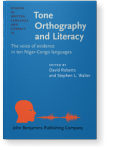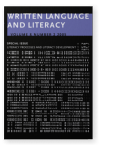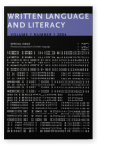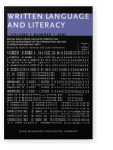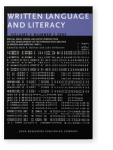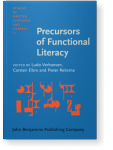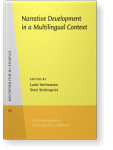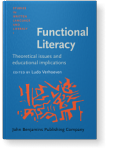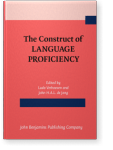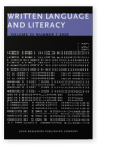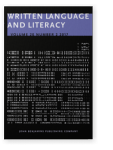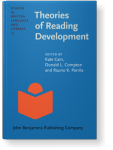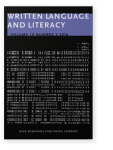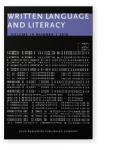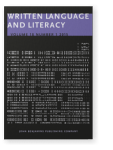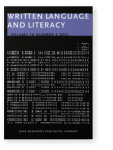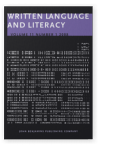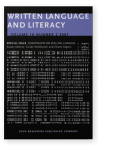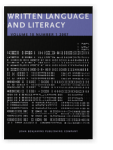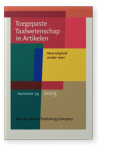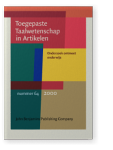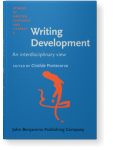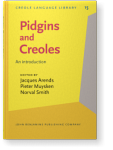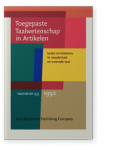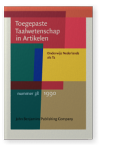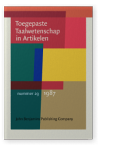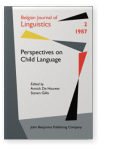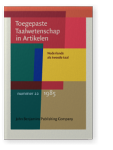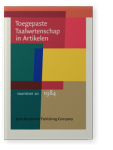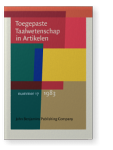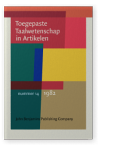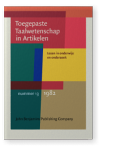Ludo Verhoeven
List of John Benjamins publications for which Ludo Verhoeven plays a role.
Book series
Literacy Processes and Literacy Development
Edited by Pieter Reitsma and Ludo Verhoeven
Special issue of Written Language & Literacy 8:2 (2005) 192 pp.
Subjects Discourse studies | Language teaching | Pragmatics | Writing and literacy
Process and Acquisition of Written Language
Edited by Robert Schreuder and Ludo Verhoeven
Special issue of Written Language & Literacy 7:1 (2004) iv, 132 pp.
Subjects Discourse studies | Language teaching | Pragmatics | Writing and literacy
Cross-Linguistic Perspectives on the Development of Text-Production Abilities in Speech and Writing. Part 1
Edited by Ruth A. Berman and Ludo Verhoeven
Special issue of Written Language & Literacy 5:1 (2002) iv, 135 pp.
Subjects Discourse studies | Pragmatics | Writing and literacy
Cross-Linguistic Perspectives on the Development of Text-Production Abilities in Speech and Writing. Part 2
Edited by Ruth A. Berman and Ludo Verhoeven
Special issue of Written Language & Literacy 5:2 (2002) iv, 172 pp.
Subjects Discourse studies | Pragmatics | Writing and literacy
Precursors of Functional Literacy
Edited by Ludo Verhoeven, Carsten Elbro and Pieter Reitsma
[Studies in Written Language and Literacy, 11] 2002. viii, 360 pp.
Subjects Language acquisition | Language teaching
Narrative Development in a Multilingual Context
Edited by Ludo Verhoeven and Sven Strömqvist
[Studies in Bilingualism, 23] 2001. viii, 430 pp.
Subjects Discourse studies | Language acquisition | Multilingualism | Pragmatics
Functional Literacy: Theoretical issues and educational implications
Edited by Ludo Verhoeven
[Studies in Written Language and Literacy, 1] 1994. viii, 493 pp.
Subjects Applied linguistics | Language teaching | Writing and literacy
The Construct of Language Proficiency: Applications of psychological models to language assessment
Edited by Ludo Verhoeven and John H.A.L. de Jong
[Not in series, 62] 1992. viii, 212 pp.
Subjects Applied linguistics | Psycholinguistics
2023 Predicting the development of Papiamento and Dutch word decoding efficiency in the Dutch Caribbean Journal of Pidgin and Creole Languages: Online-First Articles | Article
We investigated the development of word decoding (Grades 4–6; 165 children) in Papiamento (L1) and Dutch (L2) in the postcolonial context of the Dutch Caribbean islands of Aruba, Bonaire, and Curaçao. The results show a steady development over the upper Grades for both L1 Papiamento and L2 Dutch… read more
2020 Factors affecting L2 phonological awareness in Chinese-Dutch preschoolers Written Language & Literacy 23:1, pp. 109–128 | Article
The present study compared the relationship between Dutch phonological awareness (rhyme awareness, initial phoneme isolation), Dutch speech decoding and Dutch receptive vocabulary in two groups in different linguistic environments: 30 Mandarin Chinese-Dutch bilingual children and 24 monolingual… read more
2017 How executive control predicts early reading development Written Language & Literacy 20:2, pp. 170–193 | Article
Attentional and action control are two levels of executive control that are essential to early reading development. Together these levels enable the construction and monitoring of cognitive representations and of efficient task-behavior, which are both necessary to benefit from reading… read more
2017 Learning to read in a second language Theories of Reading Development, Cain, Kate, Donald L. Compton and Rauno K. Parrila (eds.), pp. 215–234 | Chapter
2016 Strategy training and mind-mapping facilitates children’s hypertext comprehension Written Language & Literacy 19:2, pp. 131–156 | Article
Children in primary school read hypertext for comprehension. However, children typically are taught reading strategies for linear text, while these strategies are not automatically transferrable one-to-one to hypertext. In the present study, a training group of 55 sixth-graders were taught four… read more
2016 Masked onset priming in lexical decision: Differential effects in adults and beginning readers Written Language & Literacy 19:1, pp. 94–113 | Article
In masked onset priming (MOPE) there is an overlap between prime and target in the onset. This has been shown to lead to faster word recognition of the target in adults in naming tasks but not in lexical decision tasks. To take a developmental stance, the present study investigated MOPE of various… read more
2015 Implicit and explicit instruction: The case of spelling acquisition Written Language & Literacy 18:1, pp. 121–152 | Article
This study examined the influence of implicit and explicit instruction for the acquisition of two types of Dutch spelling rules: a morphological and a phonological rule. A sample of 193 first grade, low- and high skilled spellers was assigned to an implicit-instruction, explicit-instruction, or… read more
2013 Effects of the Content and Language Integrated Learning approach to EFL teaching: A comparative study Written Language & Literacy 16:2, pp. 186–207 | Article
This study investigates the effects of English-medium CLIL on EFL proficiency in three European countries. Seven mainstream grammar schools spread across The Netherlands, Germany, and Italy participated with a total of 263 pupils aged 12 to 16. Several language skills were measured by means of… read more
2008 Socio-cultural predictors of reading literacy in fourth graders in Lima, Peru Written Language & Literacy 11:1, pp. 15–34 | Article
This study investigates socio-cultural cognitive literacy predictors for reading literacy (RL), tested in 314 fourth graders from two different levels of social economic status in Lima, Peru. The following variables were tested as predictors: word decoding, vocabulary, motivation to read, reading… read more
2007 Learning to spell in second grade using the spelling checker Constraints on Spelling Changes, Nottbusch, Guido and Eliane Segers (eds.), pp. 163–183 | Article
The spelling process of Dutch second-grade students using the word processor was studied in three different feedback conditions. In the no-feedback condition, they merely had to type words without being told whether the spelling was correct or not. In one of the feedback conditions they were only… read more
2007 Validation of the International Reading Literacy Test: Evidence from Dutch Written Language & Literacy 10:1, pp. 1–23 | Article
In 2001, the International Association for the Evaluation of Educational Achievement (IEA) conducted a comparative study of reading literacy (PIRLS 2001). A reading comprehension assessment instrument was developed and translated into the languages of 35 participating countries for this purpose.… read more
2005 The role of morphological family size in word recognition: A developmental perspective Literacy Processes and Literacy Development, Reitsma, Pieter and Ludo Verhoeven (eds.), pp. 45–59 | Article
This paper proposes an approach for studying the structure and development of the mental lexicon based on morphological family size. For adults, the number of morphologically related words has been shown to facilitate word recognition (Schreuder, & Baayen, 1997). This effect is assumed to be caused… read more
2005 Het Ongelijk van Netelenbos? Toetsing van Kleuters en hun Prestaties op de Cito Eindtoets Basisonderwijs Meertaligheid zonder meer, pp. 123–133 | Article
Within the context of school success of ethnic minority children in the Netherlands, it is currently debated what criteria should be applied by the Ministery of Education in assigning extra funds to children at risk. To this date, two criteria are used: level of parental education and parents'… read more
2004 Introduction: The cross-linguistic study of reading Process and Acquisition of Written Language, Schreuder, Robert and Ludo Verhoeven (eds.), pp. 3–7 | Article
2004 Orthographic constraints and frequency effects in complex word identification Process and Acquisition of Written Language, Schreuder, Robert and Ludo Verhoeven (eds.), pp. 49–59 | Article
In an experimental study we explored the role of word frequency and orthographic constraints in the reading of Dutch bisyllabic words. Although Dutch orthography is highly regular, several deviations from a one-to-one correspondence occur. In polysyllabic words, the grapheme E may represent three… read more
2002 Cross-linguistic perspectives on the development of text-production abilities: Speech and writing Cross-Linguistic Perspectives on the Development of Text-Production Abilities in Speech and Writing. Part 1, Berman, Ruth A. and Ludo Verhoeven (eds.), pp. 1–43 | Article
The studies reported in this volume of WL&L (5: 1–2, 2002) all derive from a joint project entitled “Developing literacy in different contexts and in different languages”, funded by the Spencer Foundation, Chicago. The study encompasses seven languages — Dutch, English, French, Hebrew, Icelandic,… read more
2002 Sociocultural differences in reading skills, reading motivation, and reading strategies Precursors of Functional Literacy, Verhoeven, Ludo, Carsten Elbro and Pieter Reitsma (eds.), pp. 265–286 | Article
2002 Passive voice constructions in written texts: A cross-linguistic developmental study Cross-Linguistic Perspectives on the Development of Text-Production Abilities in Speech and Writing. Part 2, Berman, Ruth A. and Ludo Verhoeven (eds.), pp. 163–181 | Article
The distribution of passive constructions is examined in written texts produced by native speakers of five Languages (Dutch, English, French, Hebrew, and Spanish), from four Age groups (aged 9–10, 12–13, 15–16 years, and adults). These languages contrast in the variety of structures available to… read more
2002 Does speech manipulation make word discrimination easier? Precursors of Functional Literacy, Verhoeven, Ludo, Carsten Elbro and Pieter Reitsma (eds.), pp. 109–118 | Article
2002 Parental and teacher commitment in emergent literacy development Precursors of Functional Literacy, Verhoeven, Ludo, Carsten Elbro and Pieter Reitsma (eds.), pp. 249–264 | Article
2002 Functional literacy in a developmental perspective Precursors of Functional Literacy, Verhoeven, Ludo, Carsten Elbro and Pieter Reitsma (eds.), pp. 3–13 | Article
2002 Clause packaging in writing and speech: A cross-linguistic developmental analysis Cross-Linguistic Perspectives on the Development of Text-Production Abilities in Speech and Writing. Part 2, Berman, Ruth A. and Ludo Verhoeven (eds.), pp. 135–161 | Article
This article analyses clause packaging in the written narrative and expository texts in Dutch, English, French, Hebrew, and Spanish by grade-school children and adults. A “clause package” is defined as a text unit consisting of clauses linked by syntactic, thematic, and discursive criteria. Our… read more
2001 10. Bilingual narrative development in Papiamento and Dutch Narrative Development in a Multilingual Context, Verhoeven, Ludo and Sven Strömqvist (eds.), pp. 255–276 | Chapter
2001 1. Development of narrative production in multilingual context Narrative Development in a Multilingual Context, Verhoeven, Ludo and Sven Strömqvist (eds.), pp. 1–14 | Chapter
2000 Interactief Taalonderwijs Voor Jonge Kinderen Onderzoek ontmoet onderwijs, pp. 37–47 | Article
This article describes the basic principles of interactive language teaching, as currently developed by the National Centre for Language Education (Expertisecentrum Nederlands). Based on a social constructivist view on learning and development, we argue that language education in the primary… read more
1997 13. Acquisition of Literacy by Immigrant Children Writing Development: An interdisciplinary view, Pontecorvo, Clotilde (ed.), pp. 219–240 | Chapter
1994 6. Decolonization, language planning and education Pidgins and Creoles: An introduction, Arends, Jacques, Pieter Muysken and Norval Smith (eds.), pp. 65–74 | Chapter
1994 Linguistic diversity and literacy development Functional Literacy: Theoretical issues and educational implications, Verhoeven, Ludo (ed.), pp. 199–220 | Article
1994 Modeling and promoting functional literacy Functional Literacy: Theoretical issues and educational implications, Verhoeven, Ludo (ed.), pp. 3–34 | Article
1992 1. Modeling and assessing language proficiency The Construct of Language Proficiency: Applications of psychological models to language assessment, Verhoeven, Ludo and John H.A.L. de Jong (eds.), pp. 3–22 | Article
1992 10. Assessment of bilingual proficiency The Construct of Language Proficiency: Applications of psychological models to language assessment, Verhoeven, Ludo and John H.A.L. de Jong (eds.), pp. 125–136 | Article
1992 Mondelinge En Schriftelijke Vaardigheid In Het Nederlands Als Eerste En Tweede Taal Lezen en luisteren in moedertaal en vreemde taal, pp. 66–77 | Article
In the present study a detailed analysis was made of the oral and written language skills of 60 native Dutch and 120 non-native third and fourth grade students at Dutch primary schools. First of all, the achievement on a variety of oral language and reading and writing tasks were examined as a… read more
1992 13. Modeling communicative second language competence The Construct of Language Proficiency: Applications of psychological models to language assessment, Verhoeven, Ludo and John H.A.L. de Jong (eds.), pp. 163–174 | Article
1987 Primaire Taalverwerving: Schets van een Onderzoekterrein Toegepaste Taalwetenschap in Artikelen 29, pp. 7–47 | Article
Under the auspices of the Dutch National Science Foundation (ZWO), a research program on primary language development is being prepared. This text aims at contributing to the foundation of such a program by focusing on the main trends in research on primary language development in the Netherlands… read more
1987 Lexical Development in Ethnic Minority Children Perspectives on Child Language, De Houwer, Annick and Steven Gillis (eds.), pp. 75–91 | Article
1985 Het Meten van Culturele Oriëntatie in Relatie met Taalvaardigheid. Nederlands als tweede taal, pp. 33–49 | Article
Recently, numerous studies evaluating bilingual education programs have shown that cultural orientation and language attitude play an important role in achieving sufficient proficiency in both first and second language. Despite a long tradition . of research in the field of attitude measurement, no… read more
1984 Taalvaardigheid en Diagnostiek Van Leerproblemen Toegepaste Taalwetenschap in Artikelen 20, pp. 167–172 | Article
1984 Aspecten Van Tweetaligheid Toegepaste Taalwetenschap in Artikelen 20, pp. 173–176 | Article
1983 Tweetalig Leesonderwijs Aan Turkse Kinderen Toegepaste Taalwetenschap in Artikelen 17, pp. 182–201 | Article
In this paper a report is given of a study concerning the processes involved in the learning of reading by Turkish children when the reading instruction is simultaneously given in LI en L2. After a short survey of the literature concerning bilingualism and learning to read the design of the study… read more
1982 Leerprocessen bij Lezen en Schrijven op de Basisschool Toegepaste Taalwetenschap in Artikelen 14, pp. 123–127 | Article
1982 Toetsen Voor het Onderkennen Van Leerproblemen Bij Beginnende Lezers Lezen in onderwijs en onderzoek, pp. 62–80 | Article
A report is given of the construction and validation of diagnostic tests for the evaluation of pupils in the first stages of reading instruction. With these tests it will be possible to apply psychological principles of learning to read to the design of interventions that will facilitate the… read more
